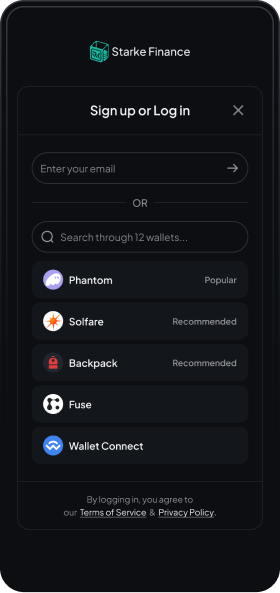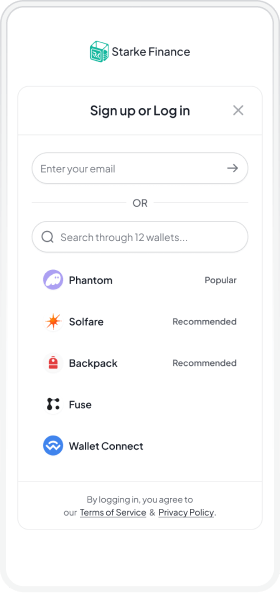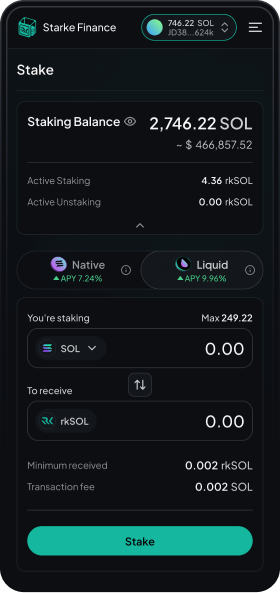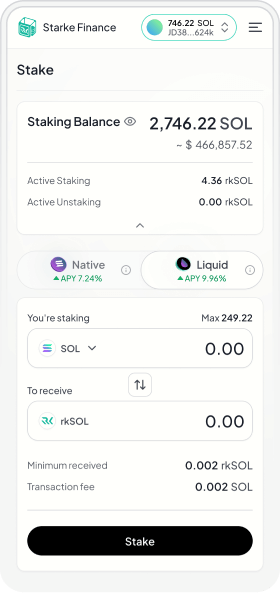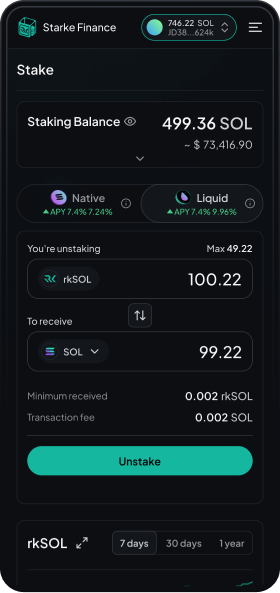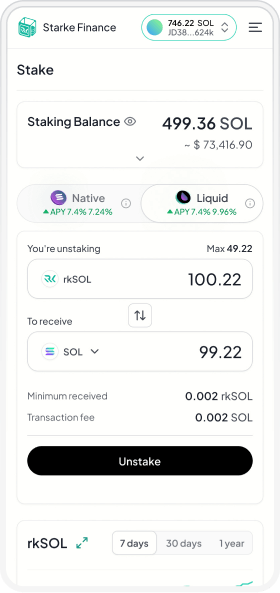What is Staking
Staking is the process of locking your Solana tokens for a set period of time, and in exchange, earning ‘Rewards’ or Interest (in the form of more Solana tokens) in the process. These tokens are delegated to Starke Validator, helping to increase its voting weight in Solana’s Proof-of-History consensus.
Why Stake with Starke Validator?
Starke Validator is a top-performing validator that plays an important role in ensuring Solana’s network security. By choosing Starke Validator for Staking your Solana tokens, you will earn maximized Rewards while helping to secure the blockchain network.
Earn Rewards
By staking your SOL tokens, you actively participate in the network’s consensus mechanism and are rewarded with additional SOL tokens, effectively earning interest on your holdings. Moreover, through additional MEV (Maximum Extractable Value) opportunities and validator revenue sharing, we will maximize your Solana yields.
Network Security
Our commitment to the Solana ecosystem is to maintain a secure, high-performing validator that contributes to network security so that DApps can focus on what they do best: Building for the future!
Powering the Future of Finance
Starke Validator is a major contributor to the funding of Starke Finance, this self-sufficiency empowers us to achieve our vision of evolving the future of finance while remaining 100% independent.
Types of Staking
Native Staking
By using Solana Native Staking capabilities, you introduce warm up and cool-down periods of your SOL, but you fully remove any smart contract risk and retain custody over your SOL, being the only one can withdraw it at all times.
Liquid Staking
Liquid Staking is an alternative to Native Staking that allows users to benefit from a protocol’s staking rewards, while receiving a receipt token (rkSOL) for their staked SOL that can be used in DeFi, ensuring that their staked assets are liquid, aka always available.
rkSOL Total Value Locked
74109.323SOL
rkSOL Current APY
6.14%
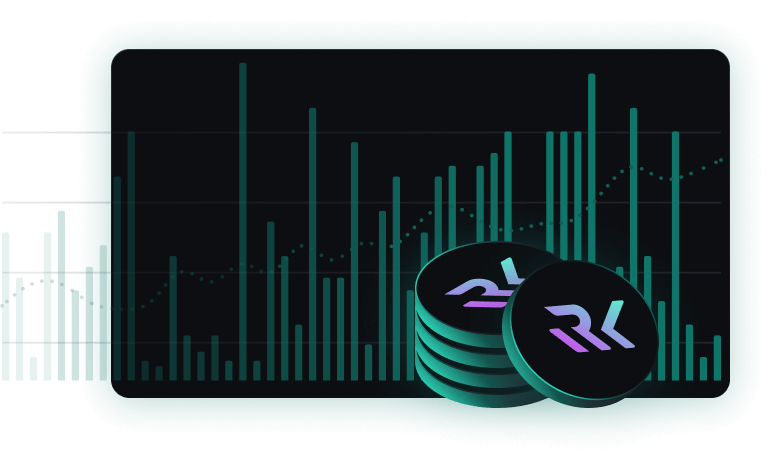
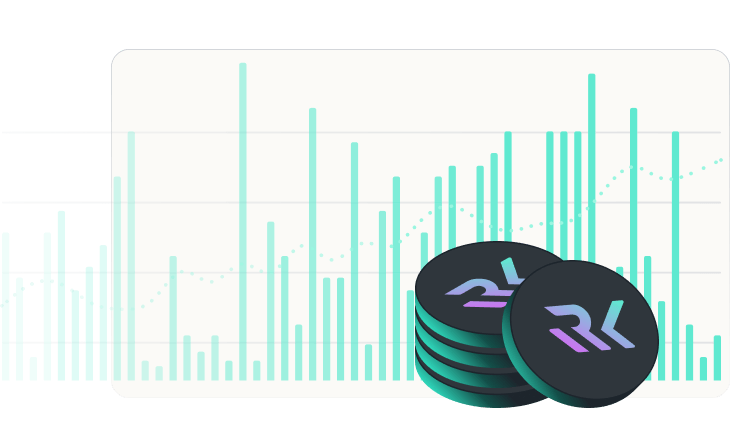
Introducing rkSOL
Starke’s rkSOL is a Liquid Staking Token (LST) within the Solana ecosystem, which is designed to enhance Staking yields while maintaining liquidity. When you Stake your SOL with Starke Validator, you will receive rkSOL tokens in return that represent your staked assets, and will automatically start accruing Staking Rewards.
How To Start Staking
Here’s a step-by-step guide for staking rkSOL on Starke:
Connect Your Wallet
Connect a compatible Solana wallet (e.g., Phantom, Solflare, or any wallet that supports the Solana ecosystem).
Choose Staking Type
Select either Native Staking or Liquid Staking, depending on your preferences.
Stake SOL and Receive rkSOL
Confirm the transaction in your wallet. After the transaction is successful, you will receive rkSOL in your wallet, which represents your staked SOL.
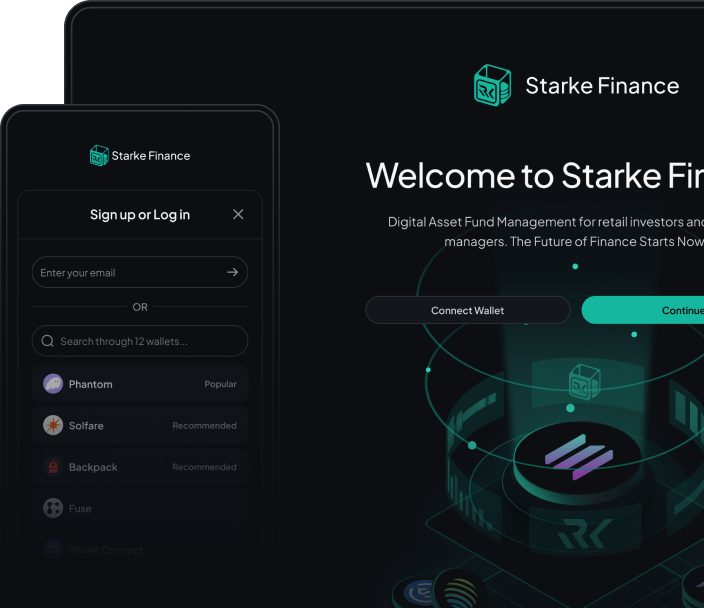
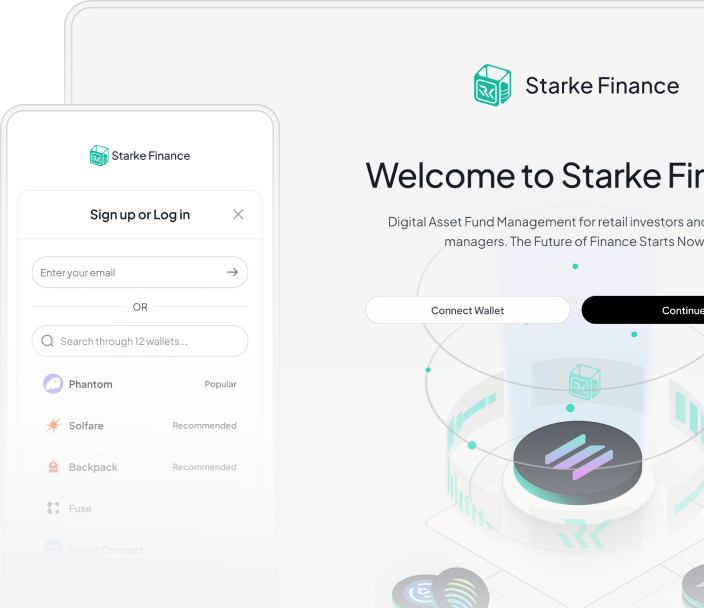
Have a Question About Staking?
Contact us below, and we will get back to you as soon as possible.
Staking FAQ
What is Proof of Stake?
On the Solana network, many different people and entities run a program on specialized computers known as a validator. Validators play a key role in maintaining and securing the Solana blockchain. Validators are responsible for processing new incoming transactions on the network, as well as for voting on and appending new blocks to the blockchain.
As different validators around the world may receive different pieces of information at different times, it is essential that the network is able to come to agreement about which transactions and data are continually added to the blockchain. The strategy by which the validators and the entire network come to this agreement is known as the consensus mechanism, and is a core challenge to building a successful decentralized blockchain network. Many different projects have attempted various solutions on how to reach consensus in a fast and cost-efficient manner.
The Solana network uses a Proof of Stake consensus mechanism (often abbreviated to PoS). Every validator on the network has an opportunity to participate in consensus by casting votes for which blocks they believe should be added to the blockchain, thereby confirming any valid transactions contained in those particular blocks. However, not all validator’s votes are weighted equally.
Validator’s consensus votes are stake-weighted, meaning the more stake an individual validator has, the more influence that one validator has in determining the outcome of the consensus voting. Similarly, validators with less stake have less weight in determining the vote outcome, and validators with no stake cannot influence the outcome of a consensus vote.
What is staking?
Staking is the process by which a SOL token holder (such as someone who purchased SOL tokens on an exchange) assigns some or all of their tokens to a particular validator or validators, which helps increase those validators’ voting weight. Assigning your tokens to add to a validator’s stake-weight is known as “delegating” your tokens. Delegating your tokens to a validator does NOT give the validator ownership or control over your tokens. At all times, you still control all your staked tokens that you may have chosen to delegate.
By staking tokens with a validator or validators, the token holder indicates a degree of trust in the validator they chose to delegate to. As validators amass larger amounts of stake delegations from different token holders, this acts as “proof” to the network that the validator’s consensus votes are trustworthy, and their votes are therefore weighted proportionally to the amount of stake the validator has attracted. By weighing the collective votes from all validators against the proportion of stake that has been delegated to them, the network reaches consensus by this Proof of Stake.
As different validators around the world may receive different pieces of information at different times, it is essential that the network is able to come to agreement about which transactions and data are continually added to the blockchain. The strategy by which the validators and the entire network come to this agreement is known as the consensus mechanism, and is a core challenge to building a successful decentralized blockchain network. Many different projects have attempted various solutions on how to reach consensus in a fast and cost-efficient manner.
The Solana network uses a Proof of Stake consensus mechanism (often abbreviated to PoS). Every validator on the network has an opportunity to participate in consensus by casting votes for which blocks they believe should be added to the blockchain, thereby confirming any valid transactions contained in those particular blocks. However, not all validator’s votes are weighted equally.
Validator’s consensus votes are stake-weighted, meaning the more stake an individual validator has, the more influence that one validator has in determining the outcome of the consensus voting. Similarly, validators with less stake have less weight in determining the vote outcome, and validators with no stake cannot influence the outcome of a consensus vote.
Why stake?
In an open and decentralized network like Solana, anyone can run a validator if they choose. A malicious validator or other bad actor could attempt to attack the network or to submit incorrect or fraudulent transactions for their own gain. Because of the Proof of Stake consensus mechanism described above, a single entity acting alone in this fraudulent manner would need to attract some amount of stake before any of their proposed activities would be weighed in the consensus vote. As more token holders choose to stake their SOL tokens to different validators across the network, and the total amount of stake on the network increases, it becomes increasingly difficult for even a coordinated and well-funded attacker to amass enough stake to single-handedly alter the outcome of a consensus vote for their own benefit. In short, the more stake that is delegated to many different validators across the network, the more safe and secure the network becomes for all of its users. Additionally, token holders who choose to stake their tokens and help secure the network in doing so, are eligible to receive staking rewards once they have delegated their tokens to one or more validators. More details on staking rewards are found below.
Are there risks associated with staking?
On many Proof-of-Stake networks, there exists a mechanism known as “slashing”. Slashing is any process by which some portion of stake delegated to a validator is destroyed as a punitive measure for malicious actions undertaken by the validator.
This mechanism incentivizes validators not to undertake such actions, as less stake delegated to a validator means that validator then accrues fewer rewards. Being slashed can also be seen as a reputational risk for retaining current or attracting potential future stake.
Slashing also poses a risk to token holders who could potentially lose some of their tokens if they have delegated to a validator which gets slashed. The presence of slashing could incentivize token holders to only delegate their tokens to validators they feel are reputable, and not to delegate all their tokens to a single or small number of validators.
On Solana, slashing is not automatic. If an attacker causes the network to halt, they can be slashed upon network restart.
How do I stake my tokens?
To stake SOL tokens, you must use a wallet that supports staking. Not all wallets support staking at this time. SolFlare.com is one user-friendly wallet that supports staking.
SOL tokens in your wallet must first be moved into a stake account. You can create as many stake accounts as you like, and deposit as much or as little SOL into each stake account as you want. Each new stake account has a unique address, and a single wallet can manage or “authorize” many different stake accounts. Check out our docs on stake account structure for more details.
In order to earn staking rewards (if inflation is enabled on mainnet beta), the tokens in a stake account must be delegated to a validator. A single stake account can only be delegated to a single validator at any time, so if you want to delegate to different validators you will need to split your tokens between multiple stake accounts.
Where can I learn about the validators on Solana?
There are various community-operated tools where you can view information about the network as well as certain performance metrics about individual validators, such as:
Solanabeach.ioValidators.app
Many validators also chose to introduce themselves and their services on the Solana forums:
https://forums.solana.com/t/validator-information-thread/577
Can I stake tokens from an account if my tokens have a lockup?
Yes. Some people may have received a stake account with locked up tokens from the Solana Foundation that was distributed in exchange for services. Tokens in stake accounts with a lockup may not be withdrawn to another wallet address before the lockup expires, but they may still be delegated to a validator to potentially earn staking rewards during this time. Rewards earned on locked tokens are deposited back into the locked stake account.
